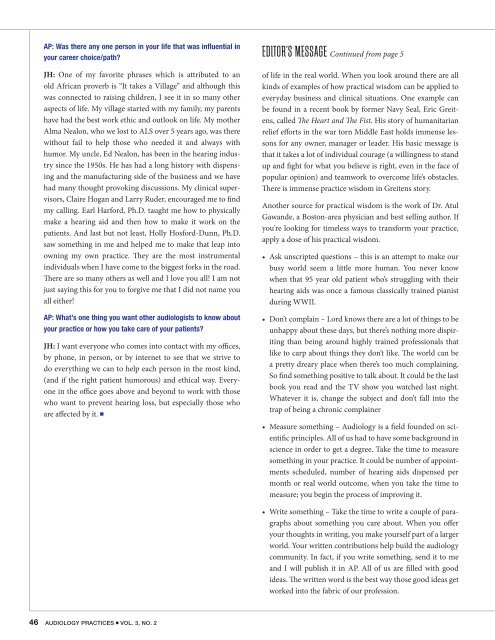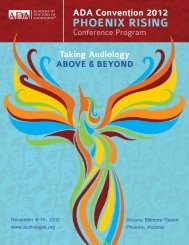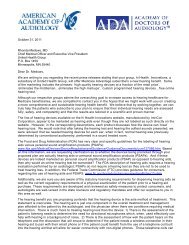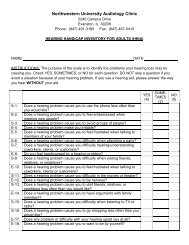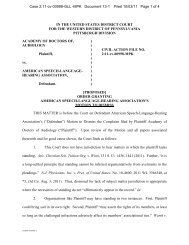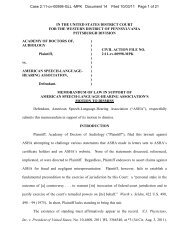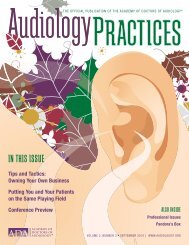IN THIS ISSUE - Academy of Dispensing Audiologists
IN THIS ISSUE - Academy of Dispensing Audiologists
IN THIS ISSUE - Academy of Dispensing Audiologists
Create successful ePaper yourself
Turn your PDF publications into a flip-book with our unique Google optimized e-Paper software.
AP: Was there any one person in your life that was influential in<br />
your career choice/path?<br />
JH: One <strong>of</strong> my favorite phrases which is attributed to an<br />
old African proverb is “It takes a Village” and although this<br />
was connected to raising children, I see it in so many other<br />
aspects <strong>of</strong> life. My village started with my family, my parents<br />
have had the best work ethic and outlook on life. My mother<br />
Alma Nealon, who we lost to ALS over 5 years ago, was there<br />
without fail to help those who needed it and always with<br />
humor. My uncle, Ed Nealon, has been in the hearing industry<br />
since the 1950s. He has had a long history with dispensing<br />
and the manufacturing side <strong>of</strong> the business and we have<br />
had many thought provoking discussions. My clinical supervisors,<br />
Claire Hogan and Larry Ruder, encouraged me to find<br />
my calling. Earl Harford, Ph.D. taught me how to physically<br />
make a hearing aid and then how to make it work on the<br />
patients. And last but not least, Holly Hosford-Dunn, Ph.D.<br />
saw something in me and helped me to make that leap into<br />
owning my own practice. They are the most instrumental<br />
individuals when I have come to the biggest forks in the road.<br />
There are so many others as well and I love you all! I am not<br />
just saying this for you to forgive me that I did not name you<br />
all either!<br />
AP: What’s one thing you want other audiologists to know about<br />
your practice or how you take care <strong>of</strong> your patients?<br />
JH: I want everyone who comes into contact with my <strong>of</strong>fices,<br />
by phone, in person, or by internet to see that we strive to<br />
do everything we can to help each person in the most kind,<br />
(and if the right patient humorous) and ethical way. Everyone<br />
in the <strong>of</strong>fice goes above and beyond to work with those<br />
who want to prevent hearing loss, but especially those who<br />
are affected by it. n<br />
46 AUDIOLOGY PRACTICES n VOL. 3, NO. 2<br />
EDITOR’S MESSAGE Continued from page 5<br />
<strong>of</strong> life in the real world. When you look around there are all<br />
kinds <strong>of</strong> examples <strong>of</strong> how practical wisdom can be applied to<br />
everyday business and clinical situations. One example can<br />
be found in a recent book by former Navy Seal, Eric Greitens,<br />
called The Heart and The Fist. His story <strong>of</strong> humanitarian<br />
relief efforts in the war torn Middle East holds immense lessons<br />
for any owner, manager or leader. His basic message is<br />
that it takes a lot <strong>of</strong> individual courage (a willingness to stand<br />
up and fight for what you believe is right, even in the face <strong>of</strong><br />
popular opinion) and teamwork to overcome life’s obstacles.<br />
There is immense practice wisdom in Greitens story.<br />
Another source for practical wisdom is the work <strong>of</strong> Dr. Atul<br />
Gawande, a Boston-area physician and best selling author. If<br />
you’re looking for timeless ways to transform your practice,<br />
apply a dose <strong>of</strong> his practical wisdom.<br />
• Ask unscripted questions – this is an attempt to make our<br />
busy world seem a little more human. You never know<br />
when that 95 year old patient who’s struggling with their<br />
hearing aids was once a famous classically trained pianist<br />
during WWII.<br />
• Don’t complain – Lord knows there are a lot <strong>of</strong> things to be<br />
unhappy about these days, but there’s nothing more dispiriting<br />
than being around highly trained pr<strong>of</strong>essionals that<br />
like to carp about things they don’t like. The world can be<br />
a pretty dreary place when there’s too much complaining.<br />
So find something positive to talk about. It could be the last<br />
book you read and the TV show you watched last night.<br />
Whatever it is, change the subject and don’t fall into the<br />
trap <strong>of</strong> being a chronic complainer<br />
• Measure something – Audiology is a field founded on scientific<br />
principles. All <strong>of</strong> us had to have some background in<br />
science in order to get a degree. Take the time to measure<br />
something in your practice. It could be number <strong>of</strong> appointments<br />
scheduled, number <strong>of</strong> hearing aids dispensed per<br />
month or real world outcome, when you take the time to<br />
measure; you begin the process <strong>of</strong> improving it.<br />
• Write something – Take the time to write a couple <strong>of</strong> paragraphs<br />
about something you care about. When you <strong>of</strong>fer<br />
your thoughts in writing, you make yourself part <strong>of</strong> a larger<br />
world. Your written contributions help build the audiology<br />
community. In fact, if you write something, send it to me<br />
and I will publish it in AP. All <strong>of</strong> us are filled with good<br />
ideas. The written word is the best way those good ideas get<br />
worked into the fabric <strong>of</strong> our pr<strong>of</strong>ession.


